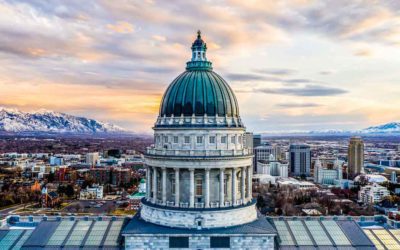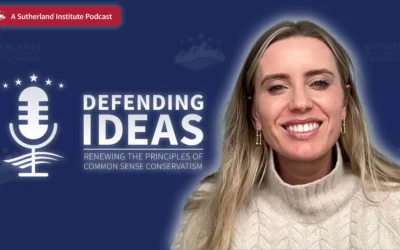
Written by Derek Monson
May 24, 2021
Originally published in Deseret News.
Voting is the voice of the people. Free and fair elections are a democratic institution and building block of free society — embodying the principle of the “consent of the governed.” Our laws should empower citizens to make themselves heard in free and fair elections.
Unfortunately, the so-called For the People Act currently pending before Congress does the opposite by undermining states that are successfully expanding access to voting and discouraging free speech. Since the bill passed the House on a party-line vote and is awaiting a committee hearing in the Senate, it is up to leaders like Utah Sen. Mike Lee and Sen. Mitt Romney to stand up and protect the voice of the people in Utah by helping to defeat the For the People Act.
Vote by mail, early voting and ballot drop boxes are some of the means by which the legislation envisions expanding access to voting. Utah already does well in all of these.
Utah has nearly a decade of experience (compared to no experience in Washington, D.C.) successfully managing a secure vote by mail program. We have also successfully administered early in-person voting and ballot drop boxes for several election cycles. In the middle of a pandemic in 2020, Utah’s success culminated in an election that went off without a hitch despite significant pandemic-driven adjustments. Election administrators at all levels in the state should be commended for that success.
Instead, the For the People Act usurps much of their decision-making authority — treating them as if they are incapable of making good election-related decisions. What’s worse, the legislation has been criticized by election administrators across the spectrum as jeopardizing successful election administration for the next several election cycles, due to its unrealistic timelines and denial of reality (e.g., election technologies that the bill envisions being used do not yet exist).
In other words, the people harmed the most by the For the People Act are those in states who already have what the legislation claims to want to give them.
The legislation would also restrict free speech in elections by attacking the privacy of anonymous donations to charitable enterprises. When you give money to a politician, that donation is disclosed by law to curb bribery. When you give money to the Rotary Club, or other social or religious causes, that donation is not, and emphatically should not be, disclosed publicly.
But if the For the People Act passes, donations to nonprofit civic institutions along with your name and home address just might be disclosed. That’s because if a group you support so much as mentions an elected politician or candidate for office in their issue-focused communications, it opens itself up to new disclosure laws. As has happened in the past, such disclosure will open donors up to politically-driven harassment.
Senate Majority Leader Chuck Schumer admitted that a part of this legislation, known as the Disclose Act, would have a “deterrent effect” on political speech and stated that it is “good to have a deterrent effect.” The people’s free expression of their views should not be deterred; it should be encouraged.
Unfortunately, our country has a long history of civic organizations pushing for important societal changes while governments try to intimidate their members into silence. During the tumultuous civil rights battles of the 1950s, Alabama tried to get the National Association for the Advancement of Colored People’s membership lists to harass them. The Supreme Court ruled that violated their Constitutional rights.
Now is not the time to further divide our country, erode trust in elections and chill speech. Utah has a long and proud history of being a uniter and finding solutions that bring people from all ideological backgrounds and beliefs together. Hopefully the United States Senate will follow Utah’s lead and take a stand for freedom by not passing this bill.
More Insights
Read More
Why is Utah at odds with Justice Department over treatment of gender-dysphoric prisoner?
Lawsuit illustrates a little-known practice of federal agencies – giving various forms of “guidance” which are not supposed to be legally binding. The practice raises serious legal and constitutional questions.
What would a parent-teacher ‘handshake’ look like in Utah?
This partnership does not allow either party to pass blame entirely to the other. There is no scapegoat, only opportunities for either party or both to work on the factors within their scope.
Restoring “The Soul of Civility” in America, with Alexandra Hudson
Most people would agree that civility seems to be in short supply in our current political environment. But in recent years, a growing chorus of voices across the political spectrum has been calling for a return to principles of civility in politics, as well as all areas of public life.


